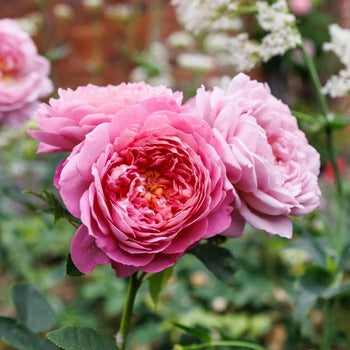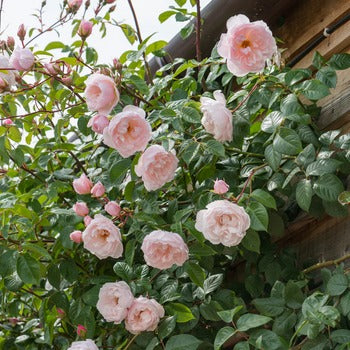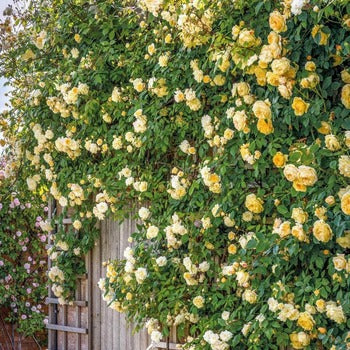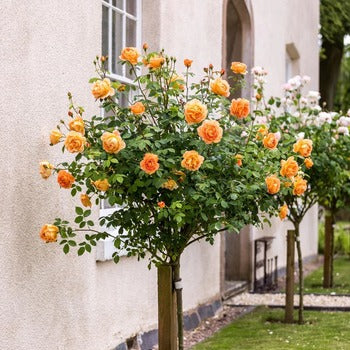Help & FAQs
Below you’ll find answers to some of our most frequently asked questions, provided by our team of rose experts.
If you have questions relating to delivery & returns, please click here.
If you have questions related to rose care, visit our rose care blog.
Important Notice
Please note that your order confirmation email may have been delivered to your Junk or Spam folder. Kindly check both folders before contacting our Customer Services team.
When ordering from us you have the choice of buying our roses as bare roots or in 2-quart pots. The bare root roses are 2 year old plants, whereas the 2-quart pots are 32 weeks old. Neither option is superior, it is simply a matter of personal choice. Whichever option you choose, your roses are guaranteed to bloom next summer – and for many summers to come.
BARE ROOT ROSES
Availability period: January – May
Bare root roses are dormant plants, dug up from the field and shipped without soil. They are the ideal choice if you’re purchasing a large number of roses, as they are very lightweight and are therefore easier to handle in the garden.
2-QUART POTTED ROSES
Availability period: April-May and Sept-Oct
Climbers generally have large blooms on not too vigorous, rather stiff growth and most repeat flower. Ramblers are in general, much more vigorous. They will produce great quantities of small flowers, although most do not repeat flower. There are exceptions however; for instance Malvern Hills and The Albrighton Rambler are repeat-flowering ramblers.
Most climbers are best for walls, trellises, arches, obelisks whereas ramblers are generally better for growing into trees and covering pergolas or large structures such as garages or sheds.
Visit our inspiration blog to discover more.
If less than 3 weeks delay…Store in a frost-free, cool place such as your garden shed or garage. Bare root plants will keep for up to three weeks tightly sealed in the box and polythene bag without a problem. You may see new growth, particularly for orders delivered in March or later - this is a good sign.
If more than 3 weeks delay…If you are expecting a longer delay before planting it is worth considering heeling-in your plants. To do this, simply remove your plants from their box and polythene bag, leave in their bundle tied together and dig a hole large enough to take the roots of your plant. Replace the soil to cover the roots. Water if conditions are going to be dry
We recommend planting potted roses as soon as possible. However, if you are unable to plant immediately, roses can be kept in their pots quite happily for a few weeks, as long as they are watered appropriately. The amount of watering required will depend on your area. Make sure the soil around the roots remains moist at all times.
The best time for planting bare root roses is when the daytime temperatures are between 40-60F. Potted roses can be planted between April and October. We ship all roses at the correct time for planting in your area.
SIZE OF POTFor best results, your pot should be 12-15 gallons or half barrels. It is surprising how much difference a larger pot will make to the performance of your rose. As the growth of your rose is determined to a large extent by the size of the root, we always recommend as large a pot as possible. A larger pot will also retain moisture for longer, which is key to a healthy vigorous plant.WHICH COMPOST?For the best results, we recommend a good quality peat based compost preferably with a slow release fertilizer.
HOW TO PLANT
Step 1:Place small stones to cover the base of your pot to about 2” to aid drainage.
Step 2: Hold your plant in the pot and see where the roots reach down to. You will want to cover all of the roots with compost.
Step 3:Remove the rose and fill with compost to this level.
Step 4:Place the plant back in the center of the pot and add compost around the plant covering the roots. Aim to have the top of the roots about two inches below the top of your pot.
Step 5:Water well.
WHAT IS IT?
This is most probably powdery mildew, a fungal disease of the foliage where a superficial fungal growth covers the surface of the plant.
CAUSES
Powdery mildew is caused by a certain combination of weather conditions. New young leaf growth is often more susceptible, until they have formed a hard surface that you find on a mature leaf.
Powdery mildew can also be caused by lack of moisture at the roots. For more information on how to water your roses, please visit our page on the Basics of Rose Growing.
PROGNOSIS
This is not a disease that will kill your plant. However, it does risk deforming foliage and making your rose less attractive and possibly less vigorous.
CONTROL
Spraying – use a fungicide such as Banner Maxx.
Mulching - will help to conserve the moisture in the ground. Apply this in April to retain what moisture is in the ground.
The cause is most likely to be either a lack of water or a lack of feed and possibly a combination of both. See Watering section for a guide to watering. See Feeding a Rose section.
Most likely, your rose has been infected by a fungal disease known as black spot.We advise treating black spot as soon as detected by spraying with a fungicide such as Banner Maxx.
The most likely cause is that it is a once flowering variety which will only start flowering in its second year in your garden, on older growth. Most of the true Old Roses (Gallicas, Damasks, Albas, Centifolias and Mosses), the ramblers and the species, and a few other assorted varieties, come under this heading. For the same reason that they won’t flower in your garden in the first year, they will also refuse to flower if you prune them too hard, so do cut them back relatively lightly.
If you haven’t bought one of the above, please contact us.
All roses take a few seasons to reach their mature shape and size. Large-flowered varieties, in particular, tend to get better over their first two or three years as the stems become thicker and provide greater support for their heavy blooms. Correct pruning is important where this problem occurs -see Pruning section.
Feeding is also important -see Feeding Roses section.Follow the instructions carefully and do not overfeed, as this can produce more vigorous soft growth which can make the problem worse.
If you’re desperate for our more upward-facing varieties, we recommend Charlotte, Darcey Bussell, L. D. Braithwaite, Molineux, Port Sunlight, Queen Of Sweden or Sophy’s Rose. However, we do encourage gardeners to try some of the roses with nodding blooms as the effect on the mature shrub can be really delightful.
It is important to smell the flowers when fully open at different times of the day as the strength can vary greatly due to a number of factors such as temperature, sunlight, age of flower etc.
We find that most of our varieties have increased fragrance in warmer weather. Conversely, when the weather is cold fragrance is much reduced.
All the descriptions of the fragrances given in the catalogue, and on the website, are provided by an independent perfume expert who has been in the perfume trade all of his life and is well respected throughout the country. He does state that some fragrances such as the myrrh and tea are not picked up by some people.
Please note that colours may variety depending on climates. The bloom colour commonly varies throughout its flowering period. Most blooms will fade with age.
Rose colors will vary with varying weather and growing conditions. High heat and strong sunlight will tend to fade colors. When a rose is not getting sufficient sunlight, less than 4 hours a day, this may also effect color.
We normally find colors are stronger during the first flowering season of the year. This is when temperatures tend to be slightly lower and blooms have a longer time to form.
We are sorry to confirm that we will not be shipping toCanada this season. At this early stage we are unable to confirm if we are able to supplyorders for next season but can confirm you will still be able to make purchases from our trusted nurseries.
The difference is in their breeding programme - the collection of David Austin cut roses has been bred specifically for floristry and they are commercially grown in greenhouses. Unfortunately, they are not available to purchase as plants to grow outside in the garden.
However, the differences stop there. The cut roses have been directly inspired by David Austin’s acclaimed English Roses for the garden, and since 1995 David Austin and David Jnr have been working together to create this new range of cut roses. These 17 cut rose varieties are specially tailored to withstand the rigours of weddings and special events while retaining the extraordinary beauty and fragrance that set David Austin Roses apart from any other.
The David Austin cut roses are available from all good florists across the country. If your florist does not stock David Austin cut roses, they will be able to special order from their regular wholesaler. We always recommend that you give as much notice as possible to your florist so that they can order well in advance.
Alternatively, you can also contact The Real Flower Company who offer David Austin cut roses as well as retail bouquets and a wedding collection. For further information visit www.realflowers.co.uk.
We have a dedicated cut rose website, which provides details of each of the cut rose varieties: www.davidaustin.com
You can also request a free brochure from the website and follow us on social media @davidaustinweddingroses.
We have published a book called ‘David Austin Wedding Roses’ that showcases some of the many magical moods that these exceptional cut roses are capable of creating with full colour photography of inspirational arrangements, atmospheres and wedding styles. It provides a host of bouquet ideas, colour themes and decorative designs. If you are a bride-to-be, floral designer or simply love roses, this is a book for you: https://www.davidaustinroses.co.uk/collections/books.
You can also contact us by calling 800 328 8893 or sending your inquiry by email to cutroses@davidaustin.co.uk
Still need to get in touch?
Please use the Chat with us button at the bottom right of your screen, or visit our Contact us page for more ways to reach our team.





